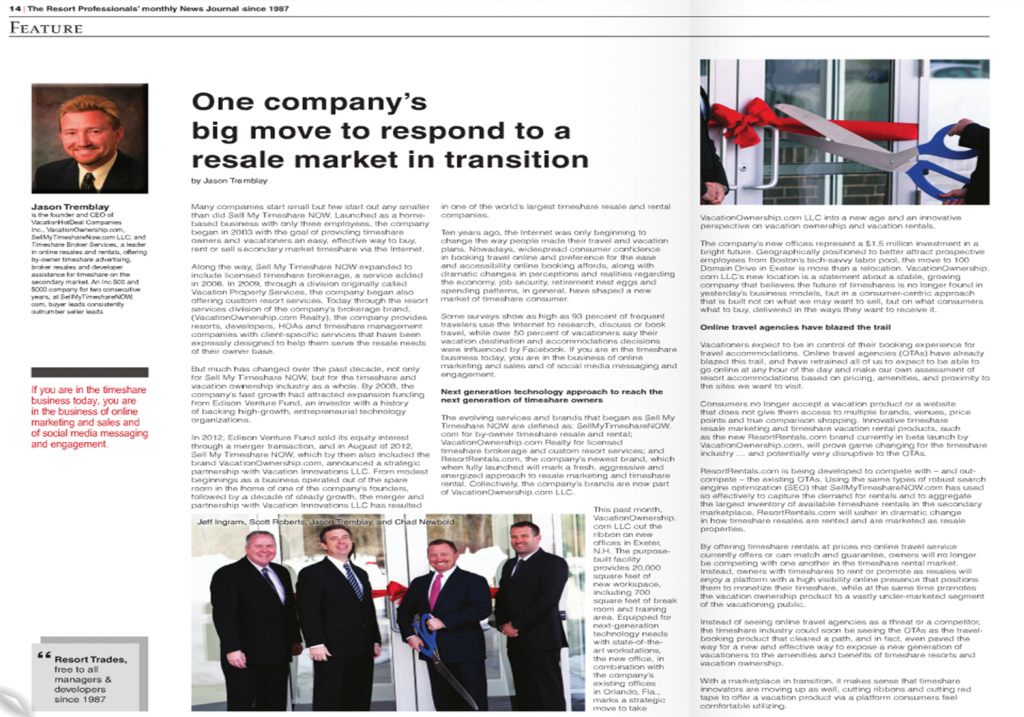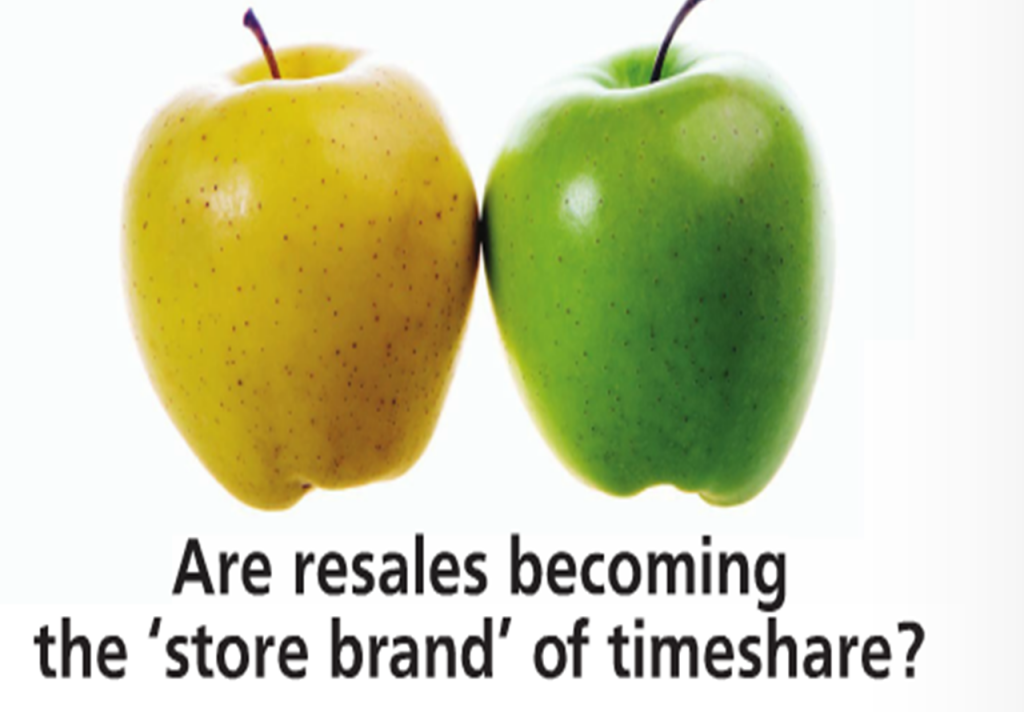VacationOwnership.com: One Company’s Big Move to Respond to a Resale Market in Transition
Tuesday, April 9, 2013

The following article by Jason Tremblay appears in this month’s issue of The Resort Trades. The print edition is available to attendees at ARDA World 2013, and by subscription. The online edition is available now at The Resort Trades website, or in The Resort Trades virtual magazine. Thank you to the publication for permission to reprint the article in full.
VacationOwnership.com: One Company’s Big Move to Respond to a Resale Market in Transition
by Jason Tremblay
Many companies start small but few start out any smaller than did Sell My Timeshare NOW. Launched as a home-based business with only three employees, the company began in 2003 with the goal of providing timeshare owners and vacationers an easy, effective way to buy, rent or sell secondary market timeshare via the Internet.
Along the way, Sell My Timeshare NOW expanded to include licensed timeshare brokerage, a service added in 2006. In 2009, through a division originally called Vacation Property Services, the company began also offering custom resort services. Today through the resort services division of the company’s brokerage brand, (VacationOwnership.com Realty), the company provides resorts, developers, HOAs and timeshare management companies with client-specific services that have been expressly designed to help them serve the resale needs of their owner base.
But much has changed over the past decade, not only for Sell My Timeshare NOW, but for the timeshare and vacation ownership industry as a whole. By 2008, the company’s fast growth had attracted expansion funding from Edison Venture Fund, an investor with a history of backing high-growth, entrepreneurial technology organizations.
In 2012, Edison Venture Fund sold its equity interest through a merger transaction, and in August of 2012, Sell My Timeshare NOW, which by then also included the brand VacationOwnership.com, announced a strategic partnership with Vacation Innovations LLC. From modest beginnings as a business operated out of the spare room in the home of one of the company’s founders, followed by a decade of steady growth, the merger and partnership with Vacation Innovations LLC has resulted in one of the world’s largest timeshare resale and rental companies.
Ten years ago, the Internet was only beginning to change the way people made their travel and vacation plans. Nowadays, widespread consumer confidence in booking travel online and preference for the ease and accessibility online booking affords, along with dramatic changes in perceptions and realities regarding the economy, job security, retirement nest eggs and spending patterns, in general, have shaped a new market of timeshare consumer.
Some surveys show as high as 93 percent of frequent travelers use the Internet to research, discuss or book travel, while over 50 percent of vacationers say their vacation destination and accommodations decisions were influenced by Facebook. If you are in the timeshare business today, you are in the business of online marketing and sales and of social media messaging and engagement.
Next Generation Technology Approach to Reach the Next Generation of Timeshare Owners
The evolving services and brands that began as Sell My Timeshare NOW are defined as: SellMyTimeshareNOW.com for by-owner timeshare resale and rental; VacationOwnership.com Realty for licensed timeshare brokerage and custom resort services; and ResortRentals.com, the company’s newest brand, which when fully launched will mark a fresh, aggressive and energized approach to resale marketing and timeshare rental. Collectively, the company’s brands are now part of VacationOwnership.com LLC.
This past month, VacationOwnership.com LLC cut the ribbon on new offices in Exeter, N.H. The purpose-built facility provides 20,000 square feet of new workspace, including 700 square feet of break room and training area. Equipped for next-generation technology needs with state-of-the-art workstations, the new office, in combination with the company’s existing offices in Orlando, Fla., marks a strategic move to take VacationOwnership.com LLC into a new age and an innovative perspective on vacation ownership and vacation rentals.
The company’s new offices represent a $1.5 million investment in a bright future. Geographically positioned to better attract prospective employees from Boston’s tech-savvy labor pool, the move to 100 Domain Drive in Exeter is more than a relocation. VacationOwnership.com LLC’s new location is a statement about a stable, growing company that believes the future of timeshares is no longer found in yesterday’s business models, but in a consumer-centric approach that is built not on what we may want to sell, but on what consumers what to buy, delivered in the ways they want to receive it.
Online Travel Agencies Have Blazed the Trail
Vacationers expect to be in control of their booking experience for travel accommodations. Online travel agencies (OTAs) have already blazed this trail, and have retrained all of us to expect to be able to go online at any hour of the day and make our own assessment of resort accommodations based on pricing, amenities, and proximity to the sites we want to visit.
Consumers no longer accept a vacation product or a website that does not give them access to multiple brands, venues, price points and true comparison shopping. Innovative timeshare resale marketing and timeshare vacation rental products, such as the new ResortRentals.com brand currently in beta launch by VacationOwnership.com, will prove game changing for the timeshare industry … and potentially very disruptive to the OTAs.
ResortRentals.com is being developed to compete with – and out-compete – the existing OTAs. Using the same types of robust search engine optimization (SEO) that SellMyTimeshareNOW.com has used so effectively to capture the demand for rentals and to aggregate the largest inventory of available timeshare rentals in the secondary marketplace, ResortRentals.com will usher in dramatic change in how timeshare resales are rented and are marketed as resale properties.
By offering timeshare rentals at prices no online travel service currently offers or can match and guarantee, owners will no longer be competing with one another in the timeshare rental market. Instead, owners with timeshares to rent or promote as resales will enjoy a platform with a high visibility online presence that positions them to monetize their timeshare, while at the same time promotes the vacation ownership product to a vastly under-marketed segment of the vacationing public.
Instead of seeing online travel agencies as a threat or a competitor, the timeshare industry could soon be seeing the OTAs as the travel-booking product that cleared a path, and in fact, even paved the way for a new and effective way to expose a new generation of vacationers to the amenities and benefits of timeshare resorts and vacation ownership.
With a marketplace in transition, it makes sense that timeshare innovators are moving up as well, cutting ribbons and cutting red tape to offer a vacation product via a platform consumers feel comfortable utilizing.
Thanks to The Resort Trades for permission to reprint this article.





